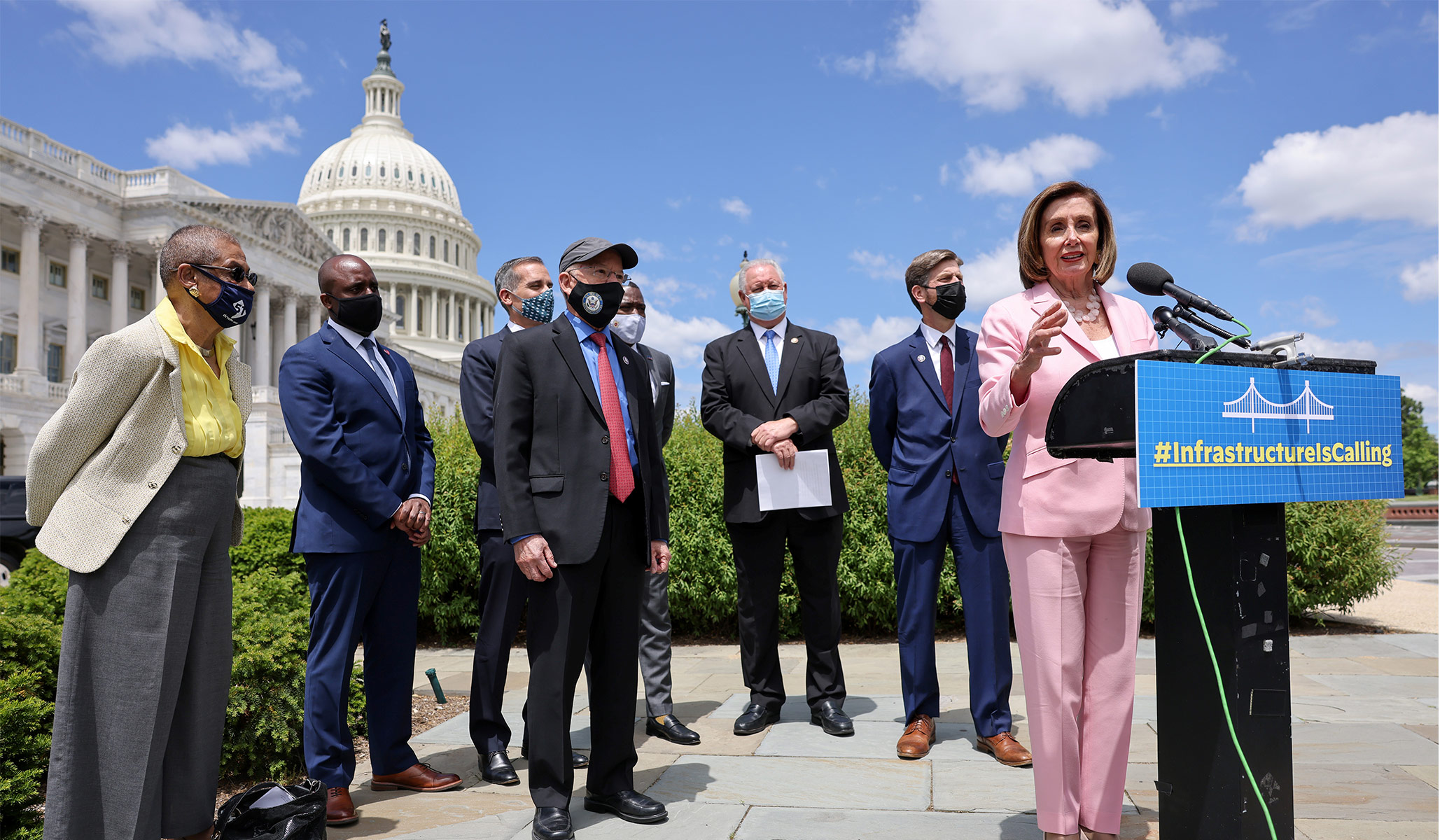(Evelyn Hockstein/Reuters)
Another President Biden visit to Capitol Hill ended in failure on Thursday. Despite Biden’s saying that his presidency depends on what happens legislatively over the next week, and House speaker Nancy Pelosi’s urging her members not to embarrass the president ahead of his trip to Europe, a planned House vote on the $1.2 trillion infrastructure bill had to be pulled yet again.
The Democrats made some progress, announcing a framework for the companion $1.75 trillion reconciliation bill, but the effort to get the infrastructure bill over the finish line in the House foundered on continued progressive opposition.
The House leadership is now talking of trying again on infrastructure next week, with a key question being whether there will be enough votes among House Republicans to make up for losses on Pelosi’s left flank.
There shouldn’t be — Republicans should vote against this bill on the merits, and also do nothing to make it easier to pass what, between the infrastructure bill and reconciliation, is essentially a joint proposal for trillions in new spending.
The background, of course, is that the Democrats have 50 seats in the Senate and a cushion in the House of Representatives of just three votes, and yet they are trying to ram through the sort of expansive policy agenda that can only practically be countenanced after a landslide. If, as the president insists, his entire legacy rests upon the passage of this pair of unjustifiably ambitious bills, the obvious solution would be to drop those bills and do something else.
Instead, Democrats are trying to have it both ways. On the one hand, they continue to push the monstrous reconciliation bill, into which they have jammed as much of President Biden’s agenda as they can, and which they intend to pass on a party-line vote. On the other, they hope to pass a less sweeping — but still unnecessary and unaffordable — $1.2 trillion infrastructure bill ($550 billion in new spending) that has already cleared the Senate. On the face of it, this shouldn’t be a problem. First, the Democrats could pass the infrastructure bill — potentially with some Republican support — and, having done so, they could turn to their larger project. But there’s a snag, in that the people who want the reconciliation bill — namely the progressives — don’t trust the people who want the infrastructure bill — namely the relative moderates — not to walk away once they’ve gotten what they wanted. And so, in an attempt to avoid this outcome, the progressives have resolved to sit on the infrastructure bill until it is clear to them that the reconciliation bill will pass, too. Thus far, nobody has blinked.
It is still unclear how this impasse will be resolved. What is clear, however, is that the Republican Party would be foolish to bail the Democrats out of their current jam in the House. Earlier in the year, we warned Republicans against acquiescing to another half-trillion dollars in new spending, this time on infrastructure. The bill is another exercise in spending money that we don’t have; the legislation includes progressive priorities on climate and other matters that stray beyond roads and bridges; and any bill Republicans helped write was clearly going to be folded into the Democrats’ larger spending project. And so it has come to pass. A month ago, we warned Republicans that, with the progressives digging in, Nancy Pelosi would soon come looking for their help in passing the infrastructure bill. That, too, has come to pass.
By the latest count, it seems possible that up to ten Republican representatives — including Don Young (Alaska), Don Bacon (Neb.), Brian Fitzpatrick (Pa.), Fred Upton (Mich.), John Katko (N.Y.), and Blake Moore (Utah) — could provide Pelosi with the votes that she cannot wangle from her own party.
There is a case that if the infrastructure bill passes, Joe Manchin and Kyrsten Sinema would feel emboldened to walk away from the reconciliation bill — exactly what the progressives fear. But if Pelosi continues to fail to muster the votes for the infrastructure bill, there’s a chance that the internal Democratic dynamic becomes more poisonous. And time is not on the party’s side, especially with a potential Glenn Youngkin victory looming in the Virginia gubernatorial race next week. Regardless, Republicans shouldn’t lend bipartisan credibility to any part of a historic spending blowout, much of which involves extending the social-welfare state on the assumption that new programs will never be rolled back.
At the end of the day, Joe Biden and his party are in such a morass because they are trying to dramatically expand the federal government without the majorities in Congress necessary to do so. It is not the role of the Republican Party to lend a helping hand.
